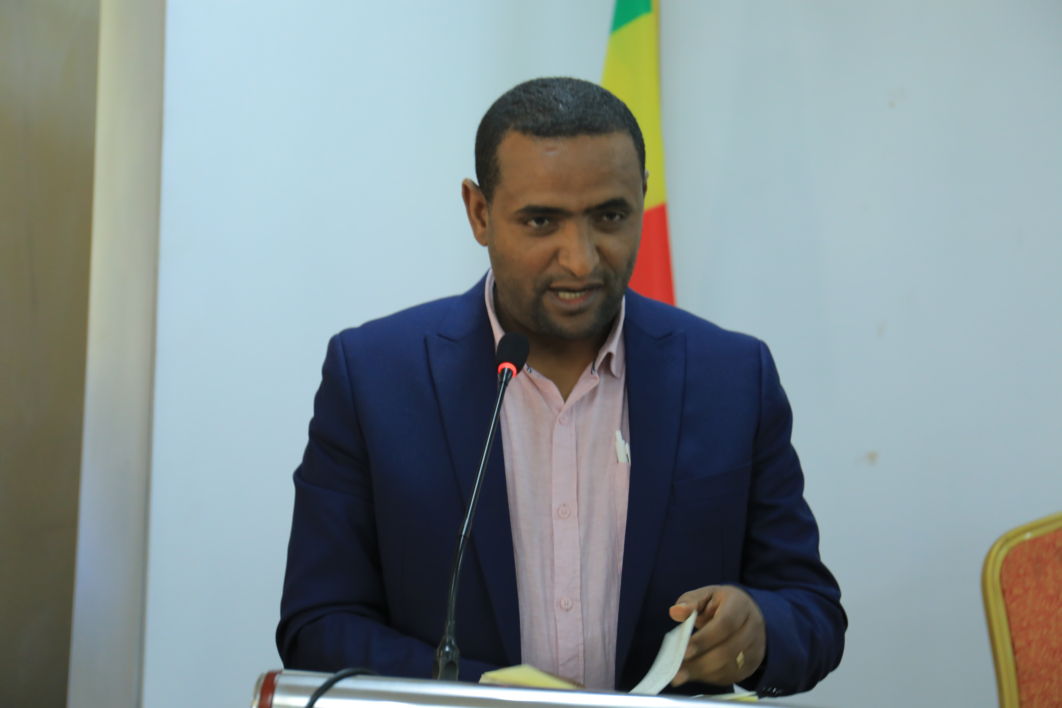Ethiopian Young Academy of Sciences (EtYAS) was established in 2015 with the initiation and financing of the Ethiopian Academy of Sciences (EAS). Since its inception, EtYAS has identified and embraced vibrant Ethiopian young academicians and scholars. EtYAS coordinates members’ talent, innovation, resources and potential in order to have maximum impact in science creation, dissemination and utilization. As a developing country, there are certainly wide areas of field where EtYAS will make contributions. So far, EtYAS has 55 members in three cohorts. The 2023 cohort constitutes 14 members and their short bios are presented as follows.
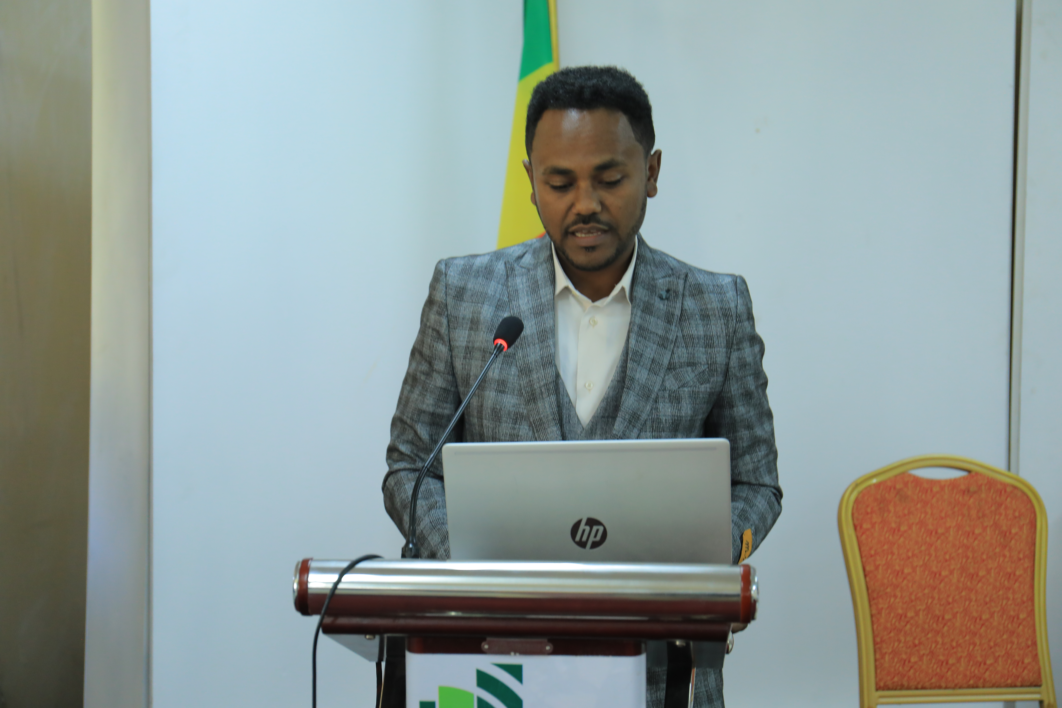
Dr. Kibur Engdawork
Department of Sociology
Addis Ababa University
Address: Main Campus, 6 Kilo
Email: kibur.engdawork@aau.edu.et

Dr. Kibur Engdawork
Department of Sociology
Throughout his tenure at Addis Ababa University, Dr. Kibur has been dedicated to teaching both undergraduate and graduate courses. He has demonstrated a commitment to academic mentorship by supervising numerous senior essays, master's theses, and PhD dissertations.
In 2019, Dr. Kibur was awarded a post-doctoral research fellowship for Social Sciences focusing on Severe Stigmatizing Skin Diseases by the 5S Foundation. This research project is a collaboration between Brighton and Sussex Medical School (BSMS) and the Organization for Social Science Research in Eastern and Southern Africa (OSSREA), funded through the National Institute for Health Research (NIHR).
His research has primarily centered around vulnerable populations, particularly those affected by neglected tropical diseases (NTDs). Dr. Kibur has made significant contributions to the field, publishing articles in reputable peer-reviewed international journals and presenting his findings at various international conferences.
Dr. Kibur has been successful in securing national and international research grants, including awards from the National Research Fund of South Africa and the National Institute for Health Care Research (NIHR), UK. His work has not only contributed to academic knowledge but has also informed national policies and programs aimed at reducing the burden of neglected tropical diseases.
Looking ahead, Dr. Kibur has ambitious plans to expand his research knowledge and skills. He aims to actively engage in the international policy-making process, offering insights that align with local realities, indigenous knowledge, and cultural contexts across different countries. His ultimate aspiration is to become one of the most highly published and cited scholars in operational research.
- Phone:-
- Email:kibur.engdawork@aau.edu.et

Habtamu Terefe (PhD)
School of Plant Sciences
Throughout his academic journey, Dr. Habtamu has been recognized with awards and has held various leadership roles. Previously, he served as the Head of the Office of the Registrar at Gondar Teachers College, Coordinator of Plant Protection and Small Cereals Research Programs at Haramaya University, and played pivotal roles as Editor-in-Chief and Editor of the Pest Management Journal of Ethiopia at the Plant Protection Society of Ethiopia.
Dr. Habtamu boasts an impressive publication record, having authored and co-authored over 45 peer-reviewed articles in both local and international reputable journals, along with numerous proceeding manuscripts. He is actively involved in teaching postgraduate courses across multiple universities, covering subjects such as Biology of Pathogens, Plant Disease Epidemiology, Molecular Concepts in Plant Pathology, and Advanced Plant Pathology.
A dedicated mentor, Dr. Habtamu has supervised 19 PhD and 14 MSc students, focusing on Plant Pathology and Plant Breeding. His research interests span the epidemiological dynamics of economically significant plant diseases, mycotoxin contamination in food grains, weather-based models for disease prediction, and the development of biofertilizers and biopesticides.
Driven by a commitment to community welfare, Dr. Habtamu aspires to produce competent graduates, develop environmentally safe disease protection technologies, introduce decision support systems, and enhance livelihoods by minimizing pest ravages and ensuring food security. Currently, he is actively engaged in teaching, supervising postgraduate students, community outreach, managing projects, and serves as the Editorial Manager of the East African Journal of Sciences at Haramaya University. Dr. Habtamu Terefe continues to make substantial contributions to plant pathology research, education, and community development.
- Phone:-
- Email:habmam21@gmail.com
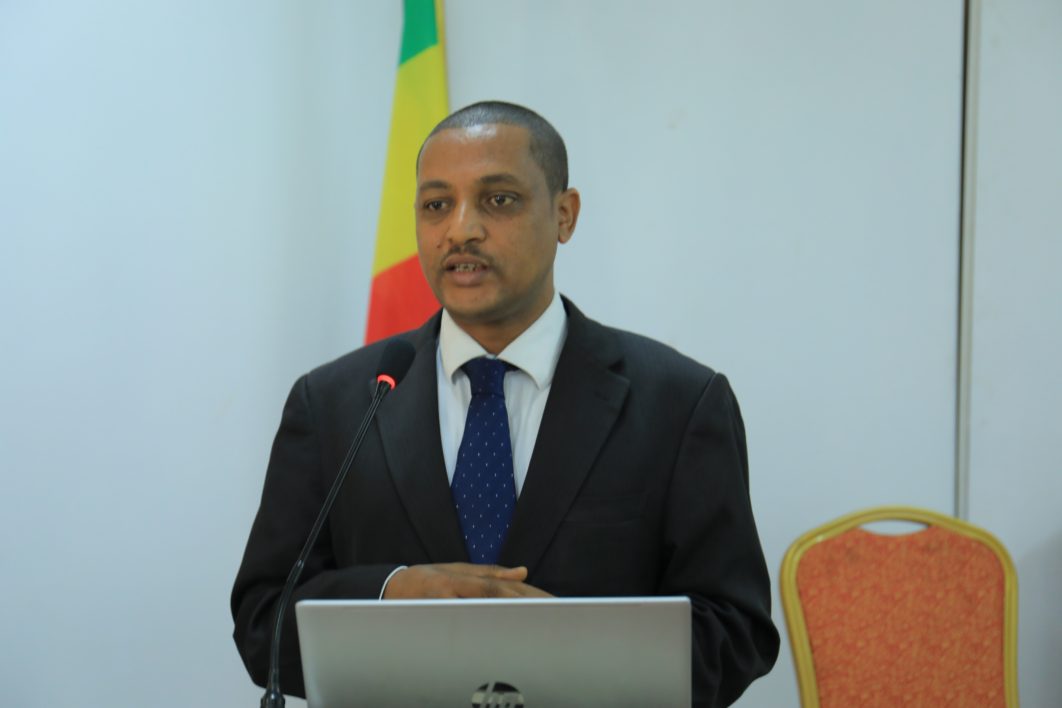
Dr. Shigdaf Mekuriaw Zewdu
In his current role as the Coordinator of an Australian Centre for International Agricultural Research (ACIAR) funded Project at the International Livestock Research Institute (ILRI) in Addis Ababa, Ethiopia, Dr. Shigdaf oversees project coordination meetings and coordinates the implementation of research activities. He provides support to project partners in Ethiopia for survey design, conduct, and analysis related to food and nutrition security, adaptive capacity, and greenhouse gas emissions in extensive livestock production. Dr. Shigdaf also served as a visiting researcher at the Arid Land Research Center, Tottori University, Japan, from May 2015 to January 2016, conducting research on Water Hyacinth for Livestock Feed. .
With over sixteen years of research experience, Dr. Shigdaf has held various leadership positions, including Ruminant Case Team Leader, Livestock Process Owner, and Center Director at the Andassa Livestock Research Center under the Amhara Region Agricultural Research Institute (ARARI), Ethiopia. Currently, he is the ACIAR Project Coordinator in Ethiopia under Unique Land Use GmbH, Freiburg, Germany. .
His extensive research contributions focus on nutrient intake and utilization efficiency, production performance, and enteric methane emission in livestock. Notable achievements include the development of feeding strategies for lactating dairy cows in Ethiopia, demonstrating significant increases in milk production while reducing methane emissions per kilogram of milk yield. .
Dr. Shigdaf has published over 27 peer-reviewed journal articles, 26 proceedings, one book, one book chapter, two scientific research reports, two workshop reports, and a manual. Recognized for his accomplishments, he received a Gold medal for completing his Doctoral Degree from Tottori University and from the Ethiopian Society of Animal Production (ESAP) in 2017. He was also awarded the Best Student Presenter at the 4th International Grassland Conference, Lanzhou University, China, and received a UNESCO/Japan Young Researchers' Fellowship award in Paris, France. .
An active member of the Ethiopian Society of Animal Production since 2006 and the Japanese Society of Animal Science since 2018, Dr. Shigdaf is deeply committed to research in Animal Feed and Nutrition, Climate-Smart Livestock Production, Measuring GHG Emission from Ruminant Animals, and Livestock Production for Food and Nutrition. His future aspirations include conducting innovative research to benefit smallholder farmers in Ethiopia and achieving high-level professionalism in his career.
- Phone:+251918709628
- Email:shigdaf@gmail.com

Dr. Daniel Jaleta Negasa
His academic journey includes a Ph.D. in Soil and Water Management from Sokoine University of Agriculture, an MSc in Watershed Management, and a BSc in Natural Resource Management from Hawassa University. Dr. Daniel also holds a postgraduate certificate in Integrated River Basin Management from the IHE Delft Institute for Water Education. .
Throughout his career, Dr. Daniel has held various roles, including Head of the Agricultural Section, Lecturer, Consultant, and Researcher in different organizations. Currently, he serves as an Executive Committee member and treasurer of the Ethiopian Forestry Society. He is also an active member of the Ethiopian Soil Science Society and the African Forest Forum. .
His primary research focus centers on studying the impact of land dynamics on watershed hydrology, specifically in areas such as land use land cover change, surface hydrology, sediment studies, plantation studies, and their interactions. Dr. Daniel is engaged in multiple research projects, including sedimentation studies at Lake Ziway, the effects of sustainable forest management on water resources at Geder Kotera Forest, and investigations into Eucalyptus age and spacing on surface runoff and sediment loss at Intoto Yeka Forest. .<br
He is also leading a new research activity on the impact of watershed management on aquatic and wetland ecosystems in the Central Rift Valley of Ethiopia (Ziway). Additionally, Dr. Daniel is involved in a study at Enor districts of Gurage Zone, examining the effects of biochar and soil and water conservation structures on selected plant species. Actively participating in various research activities funded by overseeing donors, he has published numerous peer-reviewed research articles in internationally recognized journals.
Beyond his academic pursuits, Dr. Daniel values actions such as helping individuals and society, group activities, problem-solving, and other impactful initiatives. He has demonstrated his ability to work in multicultural, challenging, and resource-scarce environments. Dr. Daniel’s overarching goal is to contribute to the field of science through his research and address challenges faced by impoverished communities through the application of scientific knowledge and development in the future.
- Phone:-
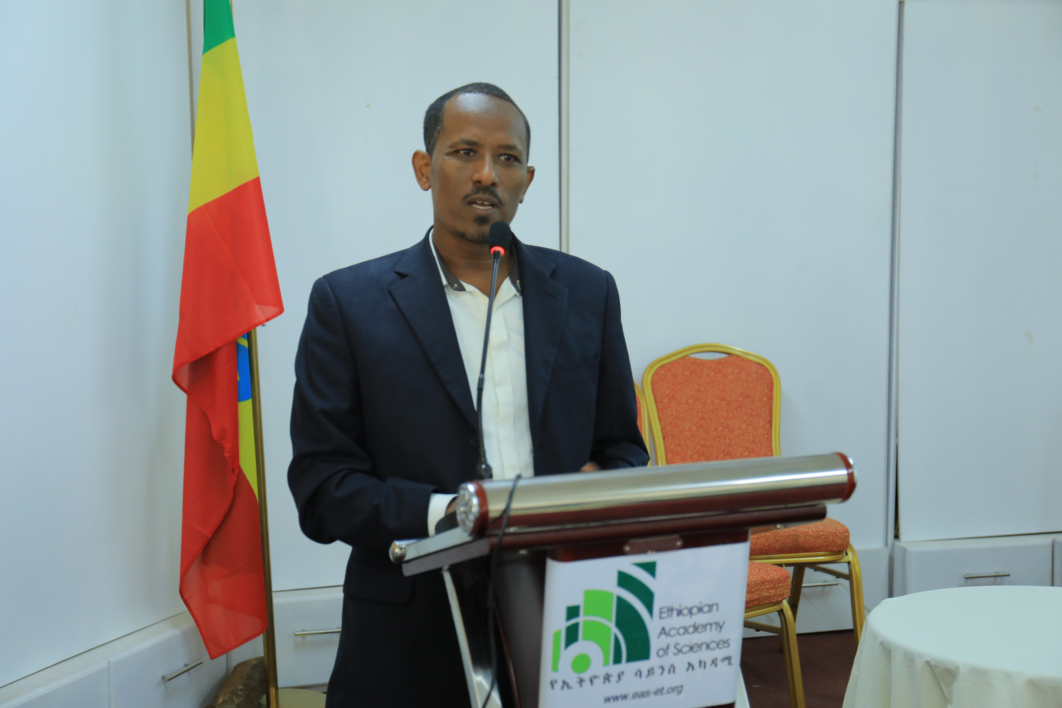
Dr. Tefemariam Berhe Weldemariam
His notable achievements include winning the LABIP award for the best poster, titled "Metagenomic Analysis of Bacterial Community in Dhanaan: Ethiopian Traditional Fermented Camel Milk." This recognition was conferred by FEMS (Federation of European Microbiological Society) at the LABIP International Science Award 2017 for Outstanding Excellence in Lactic Acid Bacteria Research with an Industrial Relevance.
With a BSc (2006) and MSc (2011) in Animal Production from Haramaya University, Dr. Tefemariam commenced his academic journey as a graduate assistant in 2006, progressing to lecturer ranks until 2018. Subsequently, he served as an assistant professor at Haramaya University from 2018 to 2020. Since 2020, Dr. Tefemariam has been a researcher at the Bio and Emerging Technology Institute.
Having published 14 articles in reputable journals and actively participating in six international conferences, Dr. Tefemariam has advised over 11 Ph.D. students and delivered guest courses at Haramaya University, Arbaminch University, and Debreberhan University.Currently, he serves as a standby technical committee member (TC-25: Milk and Milk Products) at the Ethiopian Institute of Standards.
In his current role as a senior researcher at the Bio and Emerging Technology Institute, Dr. Tefemariam focuses on starter culture development for improved fermentation and commercialization of traditional fermented foods/beverages in Ethiopia, such as Ergo/dairy products.
His research interests span Fermentation Biotechnology, Microbial Biotechnology, Proteomics, Metagenomics, Food Microbiology, and Industrial Biotechnology.
- Phone:+251918709628
- Email:shigdaf@gmail.com

Dr. Getinet Mekuriaw Tarekegn
Previously, Dr. Getinet worked as an Associate Professor of Livestock Genetics and Genomics at Bahir Dar University, Ethiopia, and as a consultant at the International Livestock Research Institute (ILRI) in Nairobi, Kenya, contributing to the Uganda Pig Genetics project. He pursued his post-doctoral research at the Swedish University of Agricultural Sciences (SLU), Uppsala, Sweden, focusing on "Genetics and Genomics of Dairy Cattle Fertility and Forage Efficiency" from September 2017 to June 2020. His research portfolio also includes a visiting post-doctoral scientist position at ILRI-BecA in Nairobi, delving into the genomics of African goats. .
With a robust academic background, Dr. His dedicated research career includes a seven-year stint at the Amhara Regional Agricultural Research Institute (ARARI), Ethiopia. AwardGetinet earned his BSc in Animal Sciences and an MSc in Animal Genetics and Breeding from the Alemaya University, Ethiopia. ed a Ph.D. fellowship in October 2012, he conducted his Ph.D. study in Applied Genetics, specifically on the molecular characterization of indigenous goat populations in Ethiopia. .
Dr. Getinet’s contributions extend beyond academia, where he has served in various leadership positions at Bahir Dar University, including Head of the Department of Animal Production and Technology, Deputy Director of the Center for Capacity Building, and Executive Director for Institutional Transformation Office.
Recognized for his excellence in research, Dr. Getinet has authored and co-authored over 75 scientific articles, working and conference papers in the domains of animal genetics, breeding, and livestock genomics. He has actively supervised and examined numerous MSc students, and he currently supervises seven Ph.D. students at various institutions, including SLU Uppsala, Addis Ababa University, Addis Ababa Science and Technology University, University of Nairobi, and Jomo Kenyatta Pan Africa University, along with three fellows of the African Biosciences Challenge Fund (ABCF) at BecA-ILRI in Nairobi, Kenya.
Dr. Getinet is a member of professional societies such as the British Society of Animal Sciences, the European Federation of Animal Sciences (EAAP), the Genetics Society of America, and the Ethiopian Society of Animal Production. In recognition of his contributions, he received the Young Professional Award from the Ethiopian Society of Animal Production in August 2017 and was identified as a Fellow of Ethiopian Young Academic of Sciences (EtYAS).
Beyond his academic and research pursuits, Dr. Getinet actively engages in community service as a lifelong member of the Ethiopian Red Cross Society. His commitment to knowledge dissemination is evident in his coordination and facilitation of an international course on Livestock Genomics and Bioinformatics in October 2019, drawing participants from 13 African countries. Additionally, he serves as an Associate Editor of the Genome Journal of Canada. Dr. Getinet has further made substantial contributions to the Livestock Technology Road Map for the Ministry of Science and Technology in Ethiopia and the Livestock Development Master plan of Rwanda. In 2022, he served on the technical team that developed the 10-Year National Biotechnology Research for Development strategy document in Ethiopia.
- Phone:(+44) 07519734921
- Email:getinet.tarekegn@sruc.ac.uk
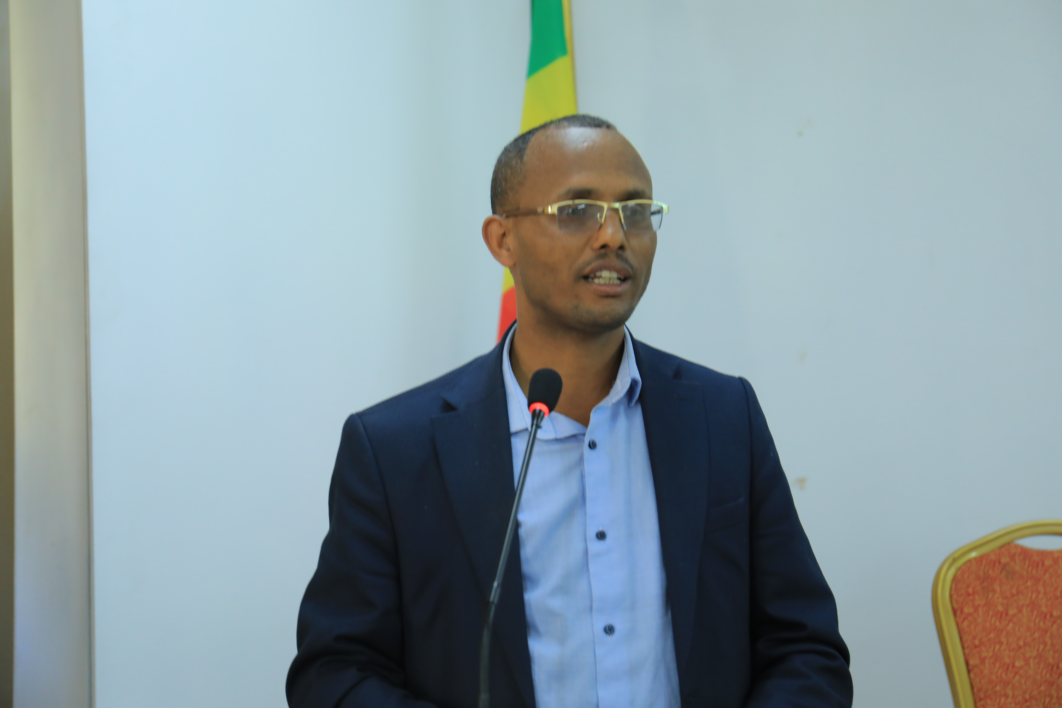
Dr. Kassu Jilcha
With diverse research interests, Dr. Kassu has contributed significantly to AI-Based Knowledge Management, Green Supply Chain Management, Industrial Workplace Safety, Quality Engineering, Technology Management, Innovation, Sustainable Development, Ergonomics, and Optimization. His doctoral dissertation focused on integrated approaches to Occupational Safety and Health in Ethiopian manufacturing.
In his academic journey, Dr. Kassu has progressed from Assistant Professor to his current role as Associate Professor at Addis Ababa University. He also served as an Assistant Professor at Adama Science and Technology University. In addition to academic roles, he took on administrative positions, including Director for the Students Career Development Center and Head of Registrar at Addis Ababa University.
As a founder of EMIRTA Research, Training, and Development Institute and a member of professional societies, Dr. Kassu has actively contributed to consultancy firms. His community involvement includes serving on committees related to Grade 12 National Examination and the Ethiopian Quality Award (EQA) Technical Committee.
Dr. Kassu’s participation in international conferences and events, such as the 5th International Conference on the Advancement of Science and Technology, reflects his commitment to knowledge sharing. He provided training on Occupational Safety and Health, Entrepreneurship, and Soft Skills, contributing to skill development.
In terms of publications, Dr. Kassu published over 45 journal articles, 3 book chapters, and 2 abstracts. He has supervised and examined numerous MSc and Ph.D. students and demonstrated adaptability by transitioning to online teaching methods amid the COVID-19 pandemic.
Engaged in impactful projects, Dr. Kassu worked as Co-investigator on a grant project focusing on indigenous knowledge. He also led a project assessing the linkage between AAU & Industries. His expertise extends to various software applications and computer skills.
Looking ahead, Dr. Kassu aspires to attain full professorship, conduct impactful research, and provide guidance to more students. Collaboration remains a cornerstone of his goals, seeking partnerships with professionals from diverse industries and academic fields.
- Phone:+251-0913017744
- Email:jkassu@gmail.com
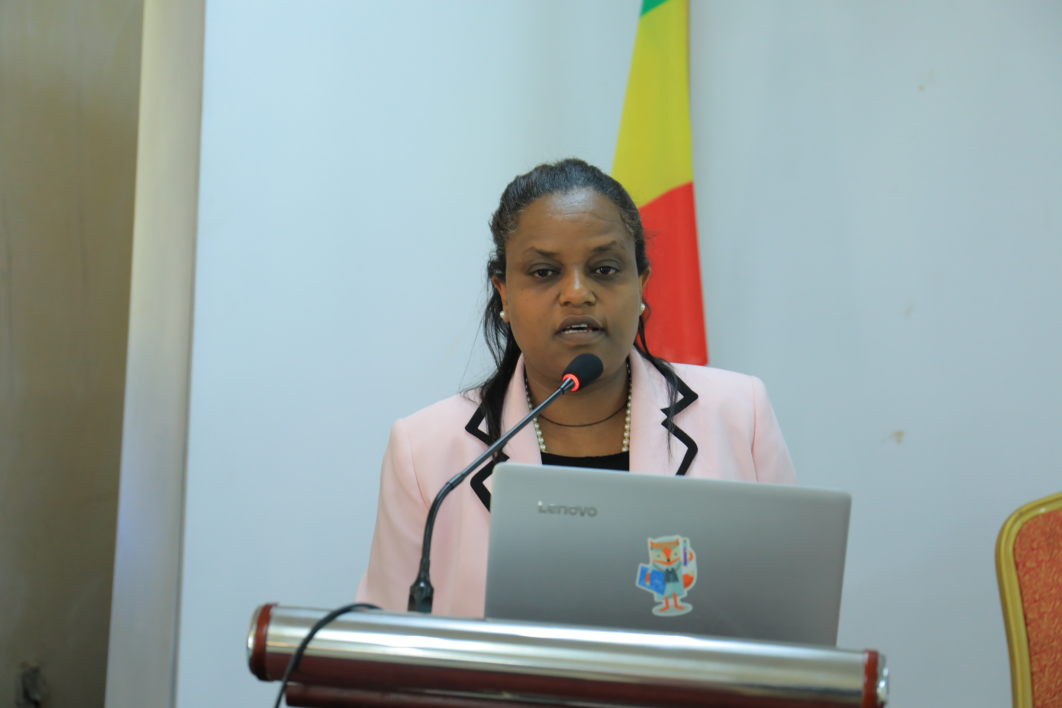
Dr. Helen Nigussie
Engaged in a multifaceted career, Dr. Helen actively participates in teaching various courses for undergraduates and postgraduates across institutions. As a passionate educator, she has contributed to curriculum revisions and served as a thesis examiner in different universities. Her commitment extends to advising graduate students, with 22 MSc and Ph.D. students under her mentorship, 11 of whom have successfully completed their studies.
Dr. Helen has undergone 20 short-term training sessions covering diverse areas, including university teaching, soft skills, biological data analysis, project management, leadership, and science communication. Her expertise in bioinformatics and proposal and scientific report writing has impacted over 200 graduate students, university instructors, and researchers nationwide.
In the realm of academic and administrative leadership, Dr. Helen chairs the Department of Microbial Cellular and Molecular Biology and is actively involved in committee assignments at CNCS, AAU. She also serves as the President of the Society of Ethiopian Women in Science and Technology (SEWiST) and holds leadership roles at the Ethiopian Society of Animal Production (ESAP) and the African BioGenome Project (AfricanBP).
Dr. Helen’s involvement in collaborative projects, both as a principal investigator and co-principal investigator, has garnered significant achievements over the past five years. Funded by institutions like Addis Ababa University, International Livestock Research Institute, Ethiopian Institutes of Agricultural Research, PEER, and USAID, these projects have resulted in the completion of seven MSc theses and numerous publications, including prestigious journals like Nature Biotechnology.
Passionate about contributing to food security and public health in Ethiopia and Africa, Dr. Helen’s research interests encompass genetic diversity, genetic resource conservation, identification of economically important traits in animals and plants, and the application of genomics in disease diagnosis.
Dr. Helen, a mother of three, is not only dedicated to her family but also aspires to be a role model, especially for young female scientists, aiming to address the gender gap in the field of hard sciences in Ethiopia. Her accolades include a travel bursary award from the International Society of Animal Genetics (ISAG) in 2014 and a young researcher award from ESAP in 2017. Her commitment to science and mentorship reflects her determination to contribute significantly to the scientific community in Ethiopia.
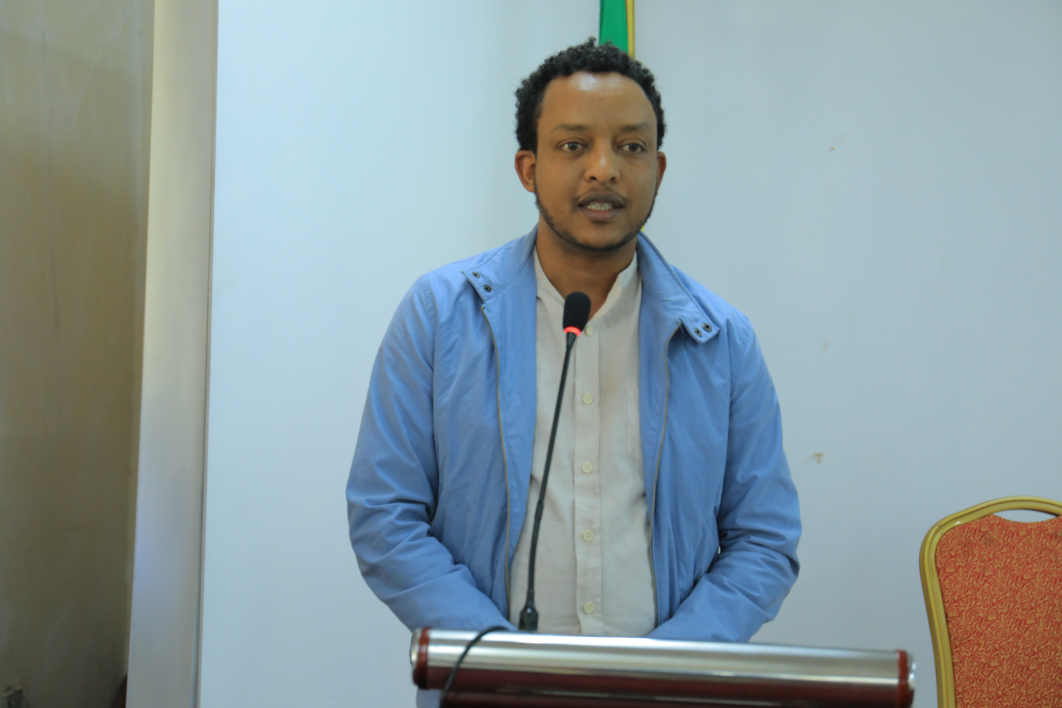
Zerihun Birehanu Sira
In academia, he served as the graduate program coordinator, headed the School of Theatre Arts, directed the AAU Cultural Centre, and engaged in various committees at school and college levels. His teaching roles have been complemented by active involvement in national and international theatre conferences, festivals, and workshops, presenting and gaining valuable experience.
Zerihun's research contributions include authored book chapters within the African Theatre series at the University of Leeds and pending publications under review for prestigious journals like Theatre Research International and Theatre Topics. Holding the position of Book Review Editor for Theatre Research International Journal, he contributes articles to Taza Nationally and The Theatre Times online platform, serving as the regional Editor for The Theatre Times in the Horn of Africa.
As a performing scholar and practitioner, Zerihun has produced and directed acclaimed plays, such as Light Avenue (2015), Four Angels (2016), African Pride (2017), Macbeth (2018), and Satan’s Suffering (2018). Notably, he directed plays for the professional Ethiopian National Theatre stage, including Filumina Marturano (January 2020), The Servant of Two Masters, and his translation of Lynn Nottage’s Pulitzer Prize-winning play, Ruined (on Progress).
Acknowledging his dedication, Zerihun received grants from Addis Ababa University, the University of Michigan African Studies, and a US Embassy Annual Program Statement Grant. Notably, he was honored with the AAU's 2019 Research Week Silver Medal.
Currently, while working on his Ph.D. dissertation in the UK, Zerihun continues to contribute to publications, practical projects, and serves both his university and the broader community. His commitment to serving academia, theatre, and community development reflects his passion for making a positive impact within Ethiopia and beyond.

Dr. Elias Ali Yesuf
Currently serving as an Associate Professor at the School of Public Health, Jimma University, Dr. Elias has held significant leadership roles, including CEO of the Institute of Health and Director of Community Based Education at Jimma University.
His research interests span various critical areas, encompassing health systems performance, outcome measurement in healthcare, health disparities, public health emergency management, decision science in healthcare, and the epidemiology of infectious diseases. Dr. Elias’s notable contribution includes the development of an index for measuring the performance of health systems in Low- and Middle-Income Countries, with a specific focus on Primary Healthcare.
With over 40 peer-reviewed publications, including contributions to The Lancet, Dr. Elias has demonstrated his commitment to advancing knowledge in the field. His aspiration is to further enhance the science of health systems performance assessment in diverse contexts, utilizing multiple sources of data. Driven by a passion for research and a dedication to improving healthcare, Dr. Elias continues to make significant contributions to the field of public health.
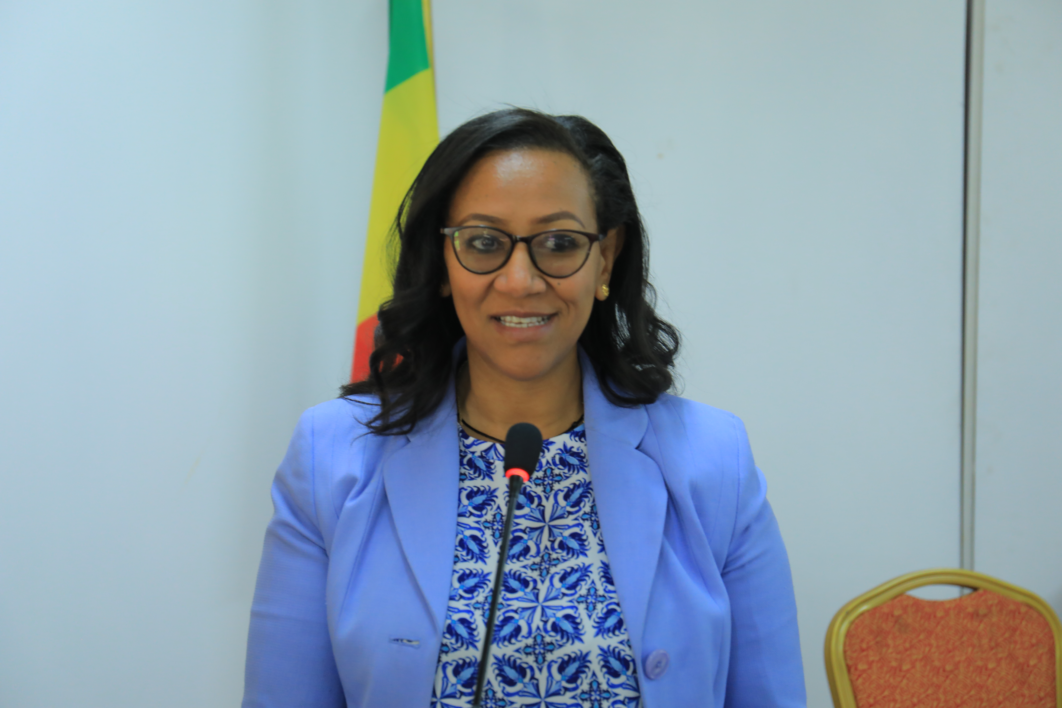
Dr. Dagmawit Tewahido
Currently serving as the Head of the Nutrition and Behavioral Sciences Department at ACIPH, Dr. Dagmawit actively engages in teaching, advising Master's students, and leading research and community service initiatives within the department. Over the past decade, she has played key roles in various research projects, serving as a technical lead and coordinator. Her expertise encompasses diverse areas such as adolescent health, social norms, health behavioral studies, sexual and reproductive health, nutrition, non-communicable diseases, infectious diseases, and more.
Dr. Dagmawit’s skills include effective teaching and advising of postgraduate students, leadership in collaborative research projects, qualitative and mixed-method research design and analysis, development and delivery of short-term training programs, and the design of Social and Behavior Change (SBC) advocacy plans. She has a record of authoring and co-authoring over 15 scientific papers.
As an active member of professional associations like EPHA and EHEPA, Dr. Dagmawit contributes to national and international initiatives, curriculum reviews, and collaborative scientific engagements. She holds a position as a research and advisory council member for Adolescents and Youth in the Ministry of Health and is also a selected EtYAS fellow.
Currently serving as a GID postdoc fellow at the Department of Global Health and Population at the Harvard T.H. Chan School of Public Health, Dr. Dagmawit aspires to advance her career in adolescent and youth health, health research ethics, health behavior studies, social norms, human-centered design, drivers of irrational drug use, and antimicrobial resistance. Her commitment to improving the health of Ethiopians and Africans at large shines through her active participation in various professional and collaborative endeavors.
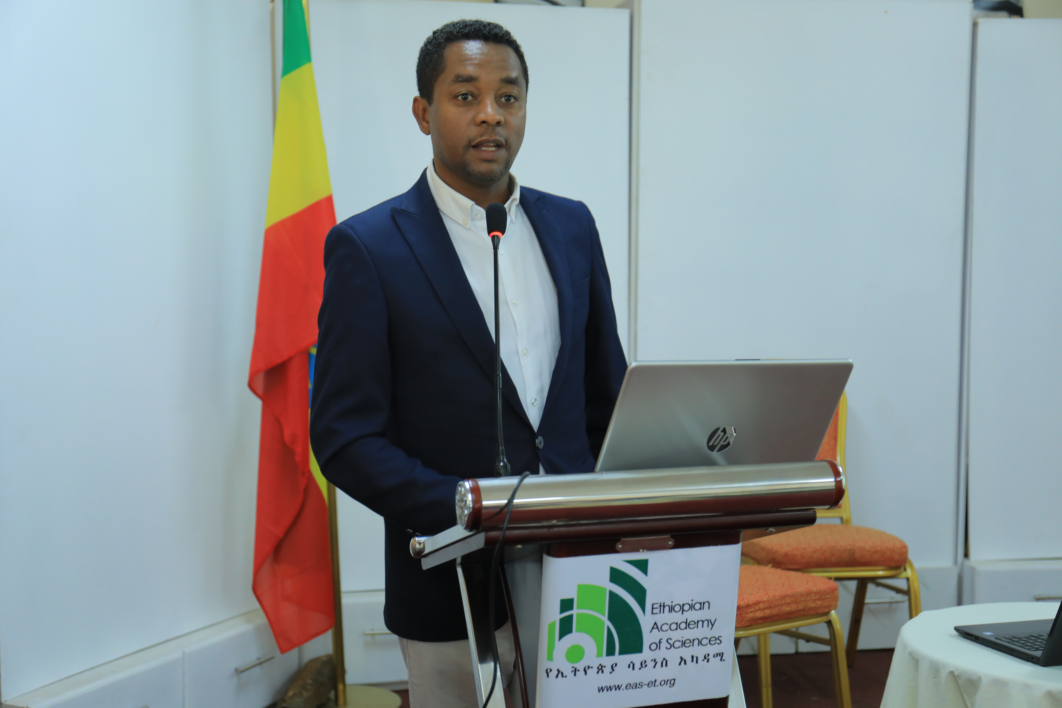
Dr. Messay Gebremariam Kotecho
School of Social Work
Dr. Messay's global engagements include works with institutions such as the University of Illinois in Chicago, USA, and the Institute of Social Work in Tanzania, as well as contributions to research and consultancy projects for Drexel and Boston Universities in the USA. With research interests covering elder's well-being, care-leaving, and migration, he has authored and co-authored 32 articles in reputable journals and supervised 32 master's and 4 Ph.D. candidates.
Beyond academia, Dr. Messay actively participates in various boards and committees, currently holding positions as a Board Member of The Ethiopian Young Men's Christian Association (YMCA), the Ethiopian Social Work Professionals Association (ESWPA), and the Addis Ababa City Government School Feeding Program. He is also a Board Member of the Ethiopian Media Authority and holds memberships in organizations such as the Africa Network of Care-Leaving Researchers (ANCR) and the International Research Network on Transitions to Adulthood from Care (INTRAC).
Dr. Messay's impact extends globally, evident in numerous awards and presentations on diverse continents. As a Civil Society Scholar Awardee (2018-19) at the School of Social Work, Indiana University, USA, he addressed the Challenges of Aging in a Developing Nation. Additionally, he served as a Visiting Professor at the Factor Inwentash Faculty of Social Work, University of Toronto, Canada, delivering talks on Social Work Education in Ethiopia: International Collaboration in Perspective. His travels and presentations have taken him to Africa (Kenya, South Africa, and Cameroon), Asia (China, South Korea, and Sri Lanka), Europe (Germany and Sweden), Turkey, Australia, Canada, and the United States.
Aspiring to attain recognition as one of the most highly published and cited scholars in gerontology, particularly focusing on older people in Ethiopia, Dr. Messay aims to leverage his research to influence evidence-based policy formulation for older adults in Ethiopia. His goal is to combine scholarly achievements with practical applications, contributing to tangible social change and ensuring the well-being and rights of older individuals in the Ethiopian context.
- Phone:+251 911 981805
- Email:messay.gebremariam@aau.edu.et

